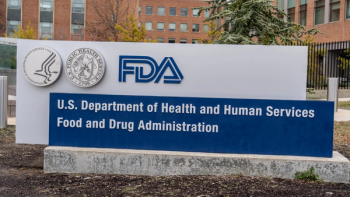
- Pharmaceutical Executive-02-01-2003
Shake Hands on Rx Drugs for Medicare
I received a letter recently from an AARP member in Carrolton, Kentucky, who wrote: ?Medicare will not help seniors with medicine costs. My husband?s a diabetic, has had two heart surgeries and asthma since childhood. He is 68 years old. I am 65 and have congestive heart failure and a lung disease. We have to spend so much on medicine, we barely live?can?t go anywhere except to the doctors and grocery. Please help people like us.?
I received a letter recently from an AARP member in Carrolton, Kentucky, who wrote: “Medicare will not help seniors with medicine costs. My husband’s a diabetic, has had two heart surgeries and asthma since childhood. He is 68 years old. I am 65 and have congestive heart failure and a lung disease. We have to spend so much on medicine, we barely live-can’t go anywhere except to the doctors and grocery. Please help people like us.”
AARP wants to help this woman and the millions like her who need more affordable prescription drugs. I’m sure the pharma industry wants to help her as well. We share a common goal: prescription drug coverage for older Americans and those with disabilities. But we don’t always agree on the best way to achieve that. For the good of the nation, we must work together to figure it out.
I have heard people say, and seen newspaper articles claim, that AARP is at war with the pharma industry. That just isn’t true. Our members and their families need and value the products the industry develops and produces. I, personally, have great respect for pharmaceutical companies and have worked with them in health promotion, disease prevention and pharmaceutical product marketing for virtually my whole career.
We have much to be grateful for-and a lot to look forward to-as research into Alzheimer’s, Parkinson’s, and other diseases progress. But our members and their families cannot afford current drug costs. When I say we need pharma’s products, I’m also saying we need them to be affordable. The marketplace is out of balance, and spending on these wonderful drugs that combat disease and ease suffering is too high. I know the industry probably disagrees. But, here’s what I’m talking about:
- Spending on prescription drugs rose, on average, about 13 percent a year between 1993 and 2001. For the next decade, it is expected to rise about 12 percent a year.
- Prices of brand name prescription drugs have been rising at nearly four times the rate of general inflation.
- Nearly one American woman in five between the ages of 50 and 64 failed to fill a prescription because it was too expensive.
- Millions of seniors are skipping doses or splitting pills to save money.
- Prescription drugs are the fastest growing item in many state healthcare budgets, not just because the prices are higher but because more people are using them-and often demanding the Cadillac when the Chevy would work just as well.
A recent Harris Interactive study found that high out-of-pocket drug costs cause massive noncompliance in medication use. Millions of Americans fail to ask doctors for the prescriptions they need, fail to fill the prescriptions they get, fail to take their full doses, or take the medicines less often than they should. Moreover, the higher patients’ out-of-pocket costs are, the more likely that patients will be noncompliant. The problems affect not just low-income seniors but middle-class people on fixed incomes as well.
AARP’s goal is affordable Medicare drug coverage, with some cost containment so that a Medicare benefit can be sustained. We are also concerned about the states’ abilities to sustain Medicaid programs. Forty states face Medicaid shortfalls driven by unsustainable drug costs, and those costs continue to drive the increase in Medigap premiums.
Businesses large and small are feeling the squeeze as well, causing many to drop drug coverage altogether or to require employees and retirees to pay significantly more.
The problem won’t solve itself. Efforts to provide relief through discount cards and other means, though laudable, are simply not enough. The problem is much bigger than that, and we must solve it systemically. At the same time, we must continue research into new lifesaving and life-prolonging drugs that will improve the quality of life for everyone.
Last year, Congress came close to establishing Medicare drug coverage. They laid the foundation for success. The House passed a bill, though in our view, it needed improvement. Although the Senate failed to pass its own legislation, 99 senators voted for some form of Medicare prescription-drug benefit. The Senate reached an implicit bipartisan agreement on several key issues, including the need to contain spiraling drug costs.
But they could not agree on the following:
- whether to target the limited dollars to seniors most in need-those with low incomes and/
- or high drug expenses
- the role of private insurers versus government in delivering the benefit and controlling the cost.
Although those differences are substantial, they are not insurmountable. Both public and private insurance can co-exist, just as they have in Medicare under the Medicare Plus Choice program.
Now, however, we face a new day:
- The immediate pressures of electoral politics are gone.
- One party controls both houses of Congress and the White House, providing fewer excuses for failure.
- Virtually all elected senators and representatives have pledged to work for a Medicare drug benefit.
President Bush has taken steps to ensure that lower cost generic drugs become available to Americans without improper delays and has stated his support for prescription drug coverage through Medicare. Of his generic drug action, the president said: “Our message to brand name manufacturers is clear: You deserve the fair rewards of your research and development; you do not have the right to keep generic drugs off the market for frivolous reasons.”
I said this was a new day, but a lot of the old politics remain. We are well aware of pharma’s heavy spending and successes in the November elections. Nevertheless, we assume that the industry’s leaders know that drug pricing and costs are changing and that they want to control them as much as they can.
I believe it is a good time for the industry and AARP to work together to pass reliable, affordable Medicare prescription-drug coverage. We are interested in a pragmatic, bipartisan, workable solution for politicians, the industry, the states, and America’s healthcare consumers, including our more than 35 million members and their families.
It may be possible to integrate drug coverage into a total benefit package. We are concerned, as the industry is, that a drug-only benefit in Medicare may be unstable because of rising costs. We are also concerned that it may not offer a benefit that is generous enough to attract an adequate number of enrollees. If that happens, the risk pool will be too small to hold down premium costs and to sustain the program over the long term.
But we seem to be at an historic moment, when the landscape regarding Medicare prescription drug coverage is about to change. Rather than being on opposite sides of the fence, I hope that AARP and pharma can change the landscape together-for the good of all our constituents and the nation.
Articles in this issue
about 23 years ago
How to Target Top Prescribersabout 23 years ago
Eisai Rises in the Westabout 23 years ago
Table of Contentsabout 23 years ago
Wintertime StewNewsletter
Lead with insight with the Pharmaceutical Executive newsletter, featuring strategic analysis, leadership trends, and market intelligence for biopharma decision-makers.



